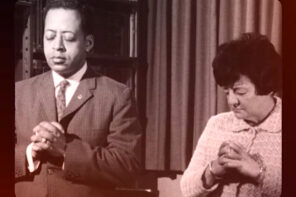What’s up with all the films about cults? Did someone spike our Kool-Aid and persuade us to start making and watching films about charismatic leaders and the people who follow?
While Paul Thomas Anderson’s The Master provides the latest (and greatest) vantage point, 2011 saw the release of three solid films on the topic that made some waves at the box office and in critical conversation: Kumaré, Sound of My Voice, and Martha Marcy May Marlene.
But why now? Is it due to the publicity surrounding Scientologists John Travolta and Tom Cruise? Or is it that a member of the LDS Church has a chance of being president? Or that, with Romney in the limelight, the people of the United States have become (however dimly) enlightened about that “strange” tradition called Mormonism? Evangelicals, who overwhelmingly support the GOP, have had to make bedfellows with what many still believe to be a cult.
Just as the years since 9/11 have sharpened millions of Americans’ understanding of Islam (not that it doesn’t have a ways to go), we seldom take notice of what was once deemed dangerous and demented until actual faces are put to it; staring face to face we begin to see a reflection.
Empathetic Cinema?
Over the course of the past decade here have been films with cultic themes, like Mindstorm (2001), Savage Messiah (2002), Believers (2007), and The Collective (2008), but those were few and far between. More importantly, the prior films were critically panned, in no small part because their filmmakers saw only the shock value of the stories and failed to get inside the reality of spiritual seeking, leading, and following. Which is what makes this new slew of films so fascinating: we the audience remain repulsed by the abuses of power, but each provides a more nuanced and even empathetic view that allows us to see just why this might all be so appealing.
The three films of 2011 each dug into the undercurrents of small groups of intentional and unintentional communities, and the powers that keep people hidden under the thumb of controlling and charismatic leaders. (There are the makings of a college course somewhere in here.)
The Borat-like Kumaré took an ingenious and deeply devious documentary approach. Director/writer/actor Vikram Gandhi grew his hair out, fashioned himself an Indian Guru spouting vacuous claims about spirituality, and gained a following. Like Sacha Baron Cohen’s Borat and Bill Maher’s Religulous, Gandhi sets people up so that the joke is on them. Unlike Cohen and Maher, Gandhi at least acts like he has a conscience and can’t fully take the charade. Tagged “The True Story of a False Prophet,” the film begins to display the Orwell adage, “He wears a mask and his face grows to fit it.” A whiff of humanity breaks down the fullness of the performance and the “setting free” of the real life characters is a stab at redemption. How far Gandhi and his companions can be forgiven the deception is another question.
The fictional Martha Marcy May Marlene, chilling in its realistic portrayals of life on a hippie-like commune, explores the general mundanity of a domineering intentional community. John Hawkes plays the leader, Patrick, whose monstrous abuses are at odds with his happy guitar strumming; he’s twisted but he’s got a nice smile. And “Martha” (Elizabeth Olsen) carries around her damaged life, seeking a fine balance between the familiar family and a rejection of bourgeois values. The persistent tensions among her circles of trust ultimately breaks down the glib conviction that “home is best.”
Slightly less convincing, but keeping with new approaches to secretive and seductive sects, is Sound of My Voice, a fictional account of two investigative journalists who infiltrate a cult, hidden in a basement of the Los Angeles suburbs. Brit Marling, who seems to be showing up all over lately, co-wrote and co-starred as a charismatic leader who has returned from the year 2054 to help those in need get by. There’s a Blair Witch feeling to it as the two investigators begin with the premise that the followers—the “real” followers, not them—are weak “suckers” looking for meaning, and are willing to be led into strange basements. Vulnerabilities break out all around as the strong and the weak, the suckers and the sucker-punchers, become difficult to separate.
The Master
Under the gaze of Paul Thomas Anderson, charismatic leadership and the naïve follower go viral and carry beyond the isolated hippie-commune and wayward seekers. No longer is the cult hard to find, it just might find us.
Anderson is allegorically adept, ostensibly making films about one subject while really spinning tales of broader cultural currents. His previous film, There Will be Blood, I have argued, is not so much about a single individual prospector who strikes it rich through oil and blood, but about the rebirth of the United States as a world force at the start of the twentieth century. And his first great film, Boogie Nights, is about a porn star, but also a cultural history moving from the 1970s to the Reaganite ’80s, and shifting attitudes toward sex, drugs, and rock and roll. He’s a great filmmaker, with a brilliant grasp of imagery (even the choice to shoot much of the film in 65mm is a striking one in an age of digital video), and an excellent writer who conducts real research and then re-creates the history.
Although fast and loose with the historical truth, The Master more or less tells the story of L. Ron Hubbard and the birth of Scientology. What emerges of course is another allegory, this time about the mid-twentieth century United States and the spiritual seeking that develops out of the postwar period. What we get is a mixture of mid-century psychoanalysis, a new emphasis on data collection and mining, and a tip of the hat to the scientific method, no matter how far from rigorous that might be.
“The Master” himself is Lancaster Dodd (Philip Seymour Hoffman) who uncovers stories from the individual’s past, via hypnotic suggestion, and turns these personal stories into sacred ones. Psychotherapy mixes with self-seeking, and a cosmological structure is set in place pointing toward a more pure, perfect, and pleasant tomorrow. No longer do mythologies remain in the distant past, disconnected from our life worlds; now we find our very selves (souls, or what Hubbard termed the “thetan”) implanted in mythical history.
“1950” is repeated throughout Anderson’s film, making clear they are at the midway point of the “American century,” in the fledging years of the Baby Boomer generation. Sociologist of religion Wade Clark Roof has discussed this group as the “generation of seekers” who ultimately create a “quest culture” that winds up in a “spiritual marketplace.” This is the era that began the decline of mainline Protestantism, the upswing of evangelical and fundamentalist Christianity, and the social-theological stirrings that led to Vatican II, all of which ultimately intersected with the shifts in population demographics following the 1965 Immigration Act and the varieties of religious experiences that came with the new settlers. The Master is not about a cult, but about the beginnings of our current spiritual situation, an age that knee-jerks the mantra, “I’m spiritual, not religious.”
Masters of Our Own Domain
If there is one thing that the four recent films hold in common, it’s that each charismatic leader plays and preys on the personal histories of the individual followers. Each leader downplays institutions, rigorous creeds, and clear-cut ethics. In their place, the single individual becomes the arbiter of sacred history; the ultimate authority. The true trick of charismatic leadership, then, is not in getting anyone to drink the Kool-Aid or donate the money, but in getting people to believe that they are doing it all themselves. We are all given the script and collectively recite the creed, “we are all individuals.” Each of the films might portend a warning about following charismatic leaders, but if we flee them after we’ve already given up on institutions and ancient texts, we are left as authors of our own lives. Or, so we are led to believe.
Perhaps, God help us, we are our own masters. But maybe it takes a master to tell us that.




